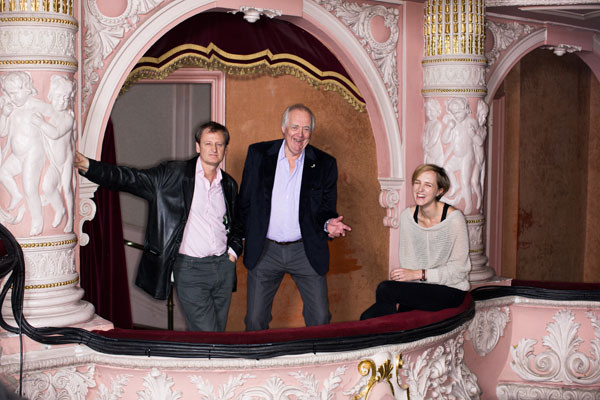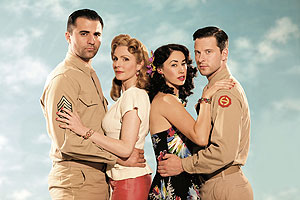Tim Rice’s musical ‘From Here to Eternity’ has a classic source

Simply sign up to the Life & Arts myFT Digest -- delivered directly to your inbox.
Tim Rice’s first new West End musical for more than a decade started with a small act of daring and a receptive ear. Many years ago, the renowned lyricist was walking down the street when a man approached him and handed him a cassette tape. The young hopeful was Stuart Brayson; on the tape were songs he had written for his pop group. Rice, whose own career had modest beginnings with a school show he wrote with Andrew Lloyd Webber called Joseph and the Amazing Technicolor Dreamcoat, was intrigued. He popped the cassette into his car stereo and liked what he heard. The two stayed in touch and one day Brayson sent Rice an idea for a musical. It was based on the James Jones novel From Here to Eternity, about American soldiers stationed in Hawaii on the eve of the 1941 Pearl Harbor attack. Rice was hooked.
“I thought, ‘This could really work’,” recalls Rice, whose 50-year career includes Evita , Jesus Christ Superstar and The Lion King. “It’s a great story. And story is king: if you’ve got a good story, you’ve got a shot.”
So it is that, several years after that chance meeting, we are contemplating the nerve-tingling prospect of a large-scale West End musical that brings Rice back to the fray as both lyricist and producer and gives Brayson the sort of break composers dream of. The two sit, side by side, in their press rep’s office, looking as perky as puppies with a new ball, while a few streets away the cast and crew of From Here to Eternity take possession of the Shaftesbury Theatre.
Many people will know the multi-Oscar-winning 1953 film version, starring Burt Lancaster, Deborah Kerr, Frank Sinatra and Montgomery Clift and famous for an iconic roll in the surf for Kerr and Lancaster. And the world is not short of wartime love stories. So isn’t From Here to Eternity a bit of a conservative choice for a lyricist whose biggest successes were groundbreaking musicals in their choice of form or subject matter? Rice argues that a new voice can make an old story fresh.
“You could say, ‘Why do it?’ But many great musicals have been based on something else. West Side Story is Romeo and Juliet, Oklahoma! is Green Grow the Lilacs, My Fair Lady is Pygmalion. They don’t improve on the original but they are separate entities. And they are all great musicals.”
The show won’t experiment in the way that, say, London Road did at the National Theatre; it is, in one sense, Rice admits genially, a return to an “older formula”. But for him the risk – and the buzz – lies in revisiting the form with a fresh young team and 21st-century practice, with an unknown composer (whom Rice rates enormously), no household names in the cast and a director who is tackling her first West End musical. They hope, says Rice, to deliver something with real “emotional kick”.
“It’s not like the Spice Girls musical [Viva Forever!], where people know the songs. Our gimmick has to be that we are good. But that’s true of all shows.”
Rice is realistic and frank about failure: musicals are difficult beasts and he has said himself, for example, that the 1988 Broadway version of Chess was “an absolute disaster”. But with From Here to Eternity he thinks one secret weapon is the book. He points out that the film was only “part of the story” and that the creative team have gone back to the 1951 novel to offer their own grittier, muscular response.
The novel delivers a warts-and-all description of the tensions between individual soldiers, the strain of army life and the legacy of the Depression. But some of those warts did not make it into the film, explains director Tamara Harvey.
“The film, though beautiful and classic, had huge restrictions placed upon it because they had to cut out all references to homosexuality and prostitution,” she says. “The novel is darker, dirtier, sexier and brutally honest about these men and women and the times. We are freed from all of those restrictions. So the musical has been able to be dirtier, darker, sexier and more brutal in its depiction of these people.”
I head to the theatre to watch the creative team shift the show from the rehearsal room on to the stage. The Shaftesbury’s elegant foyer is crammed with trunks, cables and boxes and busy with men on walkie-talkies. An elderly man picks his way across the floor to buy a ticket. “I love the film,” he tells the box office staff.

Down on the stage, the cast entrusted with responding to that man’s enthusiasm are being put through their paces in a physical warm-up. As they work through a punishing routine of star-jumps, stretches and press-ups, you can hear the clink of their army dog-tags. They have started every rehearsal with a gruelling military drill.
“It’s vital that we create a believable company of soldiers on stage,” explains Harvey. “The drill is such a fundamental aspect of army life: it’s about discipline; it’s about unity; it’s about obeying orders without question. And it’s been a very useful springboard for a lot of the physical language that we’re using in the play. There are moments when you see it in its purest form but also moments when the drill becomes part of the choreography. It doesn’t look like any other show I’ve seen.”
That physicality then is woven into the texture of the show to enter into the spirit of the story: into the testosterone-fuelled tension, the love affairs, the jittery apprehension of waiting for war. The characters, says Harvey, are edgily aware of “being on the brink of something” and live theatre can transmit that intensity: “They throw themselves into things in a way that you can only do when the world might end tomorrow.”
Brayson’s music too, he explains, seeks to embrace that poignancy. Inspired by the period, he drew on swing, early rock 'n’ roll and above all blues to create an evocative texture and to give rein to the characters’ pent-up feelings. “A lot of the songs are what’s going on in the character’s head,” he says. “In the novel there are long sections where you are inside some character’s thought process.”
So how has Rice found a voice to match? This is a lyricist prized particularly for his nimble wit, for the sort of jaunty couplet that can rhyme “farmers” with “pyjamas” (Joseph) or expound the “problem-free philosophy” of a singing meerkat and a flatulent warthog (The Lion King).
“Whether you’re writing for an Argentine dictator’s wife [Evita] or a warthog with wind problems, you still have to make what they say believable and put yourself in the position of the character,” he says. “A GI isn’t going to speak like Noël Coward. But these guys, however rough and tough they may be, all want a bit of tenderness and love, even if they dress it up as sex. Their background stories are tragic in some cases. That’s what we’re trying to bring out …It’s a grown-up show.”
‘From Here to Eternity’, Shaftesbury Theatre, London, from September 30. fromheretoeternitythemusical.com
Comments